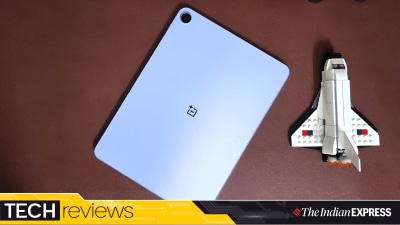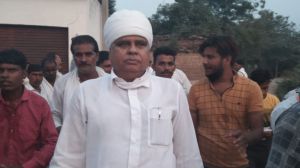Spectre Saddam
At the Karkh bus station Tuesday, near the Ibn Buniyya Mosque, drivers loaded their ramshackle green buses with pilgrims, soldiers and famil...

At the Karkh bus station Tuesday, near the Ibn Buniyya Mosque, drivers loaded their ramshackle green buses with pilgrims, soldiers and families. The road is open, the drivers said, but two weeks into the war, travellers describe the cities of southern Iraq as besieged and beleaguered. In conversations with drivers, families travelling to and from Baghdad and relatives who have stayed in contact by telephone, stories are recounted of isolated and fearful residents, dependent on dwindling rations, terrified by relentless air assaults.
In more candid moments, they complain of being trapped between a US attack and a brutal government. Without exception, they insisted that the ruling Baath Party remains in unyielding control 8212; 8216;8216;at least 90 pc,8217;8217; in the words of one 8212; with thousands of cadres deployed in green uniforms and Kalashnikovs block by block, intersection by intersection to prevent the fall of cities such as Basra, Nasiriyah, Hilla and Karbala. The conversations shed light on the loyalty of Shiites in southern Iraq to Saddam Hussein. They provide insights, too, into the fragility of their fealty.
Residents say the Baath Party8217;s numbers in these cities burgeoned in the 1990s 8212; the 15 a month members received was one of the few sources of income in the miserably poor region. Their ranks have, in part, allowed the government to saturate the streets with an almost blanket control that has yet to show any fissures.
For now, residents say, the government retains control despite a deep unpopularity. In the past two weeks, the government has played on the deep resentment the US bombing has provoked among residents, the visceral suspicion many appear to have of US intentions and anger over the suffering they endured after they rose up in 1991, only to be abandoned, in their view, by the United States.
Many of the first-hand accounts come from Karbala, a 90-minute trip from Baghdad. Since fighting started near Karbala, two drivers said the intelligence headquarters was destroyed and that shattered glass litters the streets in the heart of the city.
The intelligence office was less than a mile from the tomb of Hussein, the grandson of the prophet Mohammed. Few tanks or other heavy weapons are stationed inside Karbala, but the drivers said that the Baath Party has divided the city into a grid.
One of their offices sits 500 yards from the shrine, and militiamen have taken up residence inside Hussein8217;s tomb. 8216;8216;In every location, the party is there,8217;8217; said Ali Mijbil, who visited his family in Karbala over the weekend.
Last week, the charred carcasses of six cars sat in the streets, and fighting on the outskirts has forced hundreds of farmers and villagers to seek refuge in downtown Karbala, with its cheap hotels for visiting pilgrims.
By all accounts, the bombing has remained intense, engendering growing resentment among civilians as the siege persists. The drivers were interviewed in the presence of a government minder. 8216;8216;Everybody is in his homes,8217;8217; said a driver who returned from Karbala Tuesday morning.
The roads to Karbala and Najaf, plied by pilgrims, are among the most travelled in Iraq.
Drivers said Republican Guard soldiers were manning at least three checkpoints to Karbala. The road to Najaf has been closed. The US Army entered Najaf on Tuesday after an intense battle with Iraqi fighters there.
In a room lit dimly by a lantern during one of Baghdad8217;s frequent electricity outages, Nijim Abdel-Ridda described how, last week, the family of Aida Afus ignored warnings and set out to bury her body in one of the vast cemeteries that gird Najaf. They loaded her wooden coffin Thursday in a minibus and set off at 6 am. Two hours later, near the town of Alkifl, a US missile struck their car.
People with relatives these cities spoke of the growing isolation of families with the bombing of telephone exchanges. Iraqi television no longer broadcasts outside the capital, but some families still receive a signal transmitted by satellite. Others try to glean news from Arabic-language broadcasts of the BBC and Radio Monte Carlo.
In Nasiriyah, the family of Fawzi Malek lugged his body a few feet outside their door, dug up the flowers in their garden and thrust his corpse. The family of Malek insisted that American snipers had crossed the Euphrates last week to prey on residents.
Some said women, wearing the black chadors, would not venture outdoors. They believed they would be mistaken for the black-clad militiamen of Saddam8217;s Fidayeen. LAT-WP
- 01
- 02
- 03
- 04
- 05































